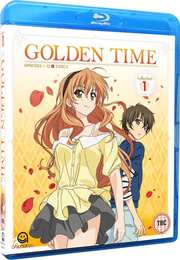Review for Golden Time Collection 1
Introduction
The romantic comedy is an odd genre in anime. Somewhere in history, it was determined that anime romantic comedies would revolve around the harem, with a handful of beautiful girls all throwing themselves at a hapless young male that scarcely deserved the attention, nor would he know what to do with it. That’s all entertaining enough, and a harem comedy done well can be delightfully funny, but it’s not exactly realistic. Real life relationships tend to be somewhat more monogamous, and more complicated and interesting. I haven’t seen that many anime reflect reality in that way. But a few years ago I did watch Golden Time when it was streamed, and came away impressed enough to put in on my to-buy list. Actually it was on my to-import list, as romantic comedies (not of the harem variety) are somewhat scarce in the UK. But a couple of years ago MVM released Toradora, which has a lot of fans. Toradora’s creator also created Golden Time, which may be why Animatsu have taken a chance on it. It also showcases the voice talents of Yui Horie in a way that puts her in the voice-actor superstar league, and given I’ve been recognising her voice ever since I first watched Fruits Basket, that too is a selling point for me. But the key points are that Golden Time is about the relationship that develops between a boy and a girl... in university. That’s so far away from the anime concept of a romantic comedy that it might as well be a different universe.
Tada Banri is starting at university, practically a whole new life, although he doesn’t quite make the start he intended, by being late to the opening ceremony, and then getting lost on the way to the Law School that he will be attending. Following a couple of girls who seem to be heading in the same direction seems to be a good idea, if a little creepy, but he’s not the only one who has that idea. He bumps into Mitsuo Yanagisawa outside the store where he loses the girls, but he makes his first friend. They eventually find the school, where a wilful and flamboyant girl named Kaga Kouko walks up and congratulates Mitsuo on getting into law school, by repeatedly slapping him around the face with a bouquet of roses.
Mitsuo is Kouko’s fiancé. They’re eternally destined to be together. Kouko is Mitsuo’s childhood friend, whose overbearing affection was fine when they were kids, but is so annoying now that he’ll do anything to get away from her, including attending a different university. Kouko’s determined though, and she’s even gone as far as enrolling in the same law class. Banri’s first act of friendship is to help Mitsuo avoid Kouko. But the more time Banri spends with Kouko, the more he sees a lonely girl who is so devoted to Mitsuo that she’s missing out on the rest of life. Helping her find a social life draws the two closer together, and they start to fall for each other. But the problem is that Banri isn’t the person that he used to be, and the person he used to be wants to come back. On top of that, the girl that the old Banri loves, Linda, also goes to the same university. Annoying thing, amnesia!
The first twelve episodes of Golden Time are presented across two Blu-rays from Animatsu.
Disc 1
1. Springtime
2. Lonely Girl
3. Night Escape
4. Blackout
5. Body and Soul
6. Yes No
7. Masquerade
8. Reset
9. With You Again
Disc 2
10. In The Mirror
11. Trouble Party
12. Don’t Look Back
Picture
Golden Time gets the usual 1.78:1 widescreen 1080p transfer, common to most Blu-ray anime series. The image is clear and sharp, the animation is smooth, and there are no problems with visible compression or artefacting. Even the usual complaint about digital banding can be dismissed, as Golden Time is a series mostly set in bright, daytime locations and scenes, while the few darker and night-time scenes aren’t particularly marred by it. That’s all good as Golden Time is a decent animation, although it lacks the usual fantastic elements of more esoteric fare. This is a show that takes place in the ‘real’ world, so chances for imaginative flourish are fewer. But the character designs are great, and memorable, while the world design has the detail that you would expect from a more realistic story. Where the animators go to town is in the costumes, as in the real world, people are prone to change their clothes, and Kaga Kouko certainly has the kind of fashion sense that has people scanning the credits for a costume designer.
The images in this review have been kindly supplied by Animatsu.
Sound
Golden Time is a subtitle only release, so as you might expect, these discs offer DTS-HD MA 2.0 Stereo Japanese, which on Golden Time Part 1 are accompanied by optional translated English subtitles (apparently they are locked on Part 2). The audio is fine; the stereo offering enough space and separation for the few effects in what is really a comedy drama, light on action. The dialogue is clear throughout, and the voice actors are well suited to their roles. Central of course is Yui Horie, who plays Kaga Kouko, and also sings the theme songs to the show. She certainly creates a memorable character, but the other actors deliver performances that are equal to the bar that she sets. The subtitles are accurately timed, and free of typographical error.
Extras
Golden Time is presented on these discs with silent, static menus. Each episode is followed by a translated English credit reel.
The only extras are on disc 2, and amount to the textless credit sequences, and trailers for Watamote, Dog & Scissors, Majestic Prince, and Listen to Me, Girls, I am Your Father!
Conclusion
It’s rare to see a romantic anime in the UK between just two people, especially two adults, so much so that I can think of only one other release, Rumbling Hearts, which is pretty much incomparable to Golden Time. It isn’t that such anime don’t get made, it’s just that we don’t get them too often in the UK, where the usual offering is the high school harem comedy, which are built more around juvenile hijinks rather than human relationships. The occasional high school romance has been released here, Toradora and Suzuka (partially), but they are limited by the ages of their protagonists, the tender blush of awkward first love. Given all that, it might seem faint praise to say that Golden Time is the best (adult) romantic comedy drama anime I have yet seen, but it really is a great show, worthy of a superlative or two in its own right.
Of course it’s not just two people in love, as that would make for a rather short and uninteresting show. There are plenty of impediments on the route to romance in the form of friends, and they too have their plot threads that play out in the show. On top of all that, a simple romantic drama could easily become a soap opera, and anime tends towards the fantastic elements to make it seem out of the ordinary. Golden Time introduces the amnesia angle for one of the protagonists, which has an increasing effect on the story as it progresses, and is established in an interesting visual way.
You might be forgiven for thinking that Golden Time is the Kaga Kouko show in all but name; she is a force of nature as a character, filling the screen with her personality to the degree that it looks as if the world revolves around her. Yui Horie, who I first encountered as Tohru Honda in Fruits Basket, and Naru Narusegawa in Love Hina, delivers something special here, a larger than life character that is at the same time very easy to relate to, and very believable, with an outer strength and confidence that masks inner insecurities and vulnerability. Yui Horie also sings both theme songs, credit sequences that both feature Kaga Kouko strongly. You could almost think she was the Dennis Waterman of the anime world. In actual fact, the show is about Tada Banri, and his story is the one that takes centre stage in Golden Time. One reason that Kaga Kouko, and indeed other characters such as Mitsuo, Oka, Linda, and Nana are so strong is to balance the amnesiac cipher that we meet at the start of the show. Tada Banri when we meet him is a happy-go-lucky and enthusiastic new college student, but his personality takes a little longer to define as the show progresses. In the early episodes he’s very much an observer of the mayhem that goes on around him.
Most of that mayhem comes from Kouko and Mitsuo who are in love according to Kouko, and in distress from Mitsuo’s point of view. They’re childhood friends that became girlfriend and boyfriend, but Kouko is the clingy stalker type, and Mitsuo’s tired of the one way relationship, and tries to escape by going to another university. Which is where Banri meets him on their first day of college. He’s happy to have made his first friend, but then Kouko shows up to violently congratulate Mitsuo. Banri sees this flame-haired tempestuous woman show up and he is captivated. Kouko’s also joined the law department to be close to Mitsuo, and starts attending lectures as well. Mitsuo does what he can to avoid her, which means that Banri spends more time with Kouko, and after seeing a girl who is so devoted to Mitsuo that she has no other life, he develops protective feelings towards her, even tries to get her to engage in a social life, join a club, make some friends.
That seems to be a bad idea at first, when they wind up joining a religious cult/pyramid scheme that has been recruiting at campuses, but the shared traumatic experience at the cult winds up deepening their friendship. It’s also here that we first learn about Banri’s amnesia, which he uses as a story to escape from the cult’s clutches. It’s around this time that the inevitable happens between Mitsuo and Kouko, and the message gets through to her. The resulting break-up is understandably traumatic, while the way that Kouko deals with it (a stage invasion at a rock concert) moves Banri to confess his feelings. Of course relationships are never that cut and dried and there are still a few bumps in the road before Kouko and Banri start going out.
It’s around this point that Banri’s amnesia starts taking centre stage in the story. He’s essentially a new person, recovering from an accident a year before that wiped his memories, and going to college in Tokyo is a way of getting away from family and friends that are little more than strangers now. Worse, the more comfortable he becomes in his life, the more he realises that everyone else expects his memories to return, effectively ‘killing’ the new Banri. But he can’t escape his past so easily. An early hint is when he’s rescued from an enthusiastic swarm of club recruiters by a girl named Linda, who shows a little more than the Good Samaritan interest in him. She’s friendly, likeable, and she even invites him to join her Festival Club. He and Kouko do wind up joining, and spending more time with Linda, but the penny drops when Banri visits home and finds a school photo of him with Linda. The affinity and emotional connection he develops with Linda can only be explained by lingering memories and feelings, confirmed when we meet Ghost Banri, the visual representation of his past self. It’s through this disembodied character that we learn of Banri’s past with Linda, the feelings that developed between them, and the fact that his Ghost Self wants to go back to those days. This strikingly becomes evident when his memories momentarily resurface, visually represented by his ghost possessing his body while asleep.
Most romantic stories aren’t interesting unless there are significant impediments on the road to romance, and a past self threatening to return and ‘erase’ one of the protagonists is as extreme as such impediments can get. As the end of this collection of episodes arrives, it seems that Banri has made a definitive decision as to which life he chooses, but with half of the series remaining at this point, you can guess that there will be more strife in the second half of the series.
I really do love this show. It’s a combination of an interesting and moving story and a cast of likeable and engaging characters, unsurprising given that Golden Time shares a creator with Toradora (my favourite high school romance). The amnesia angle to the story could have felt contrived and even clichéd, but the way the story develops around it feels natural and honest. The show plays mostly like a light, slice-of-life show, centring on a group of friends at university, and it’s done well enough to evoke some nostalgia in me for my own university days. Other than Genshiken, I don’t know of too many shows that are set in such institutions, where young adults are finding themselves and getting to grips with the wider world. The relationships in the show may be comparatively chaste though (they have to conform to broadcast standards after all), but boyfriends and girlfriends can hold hands in this universe without fainting from shock, and kisses might actually occur too, without nosebleeds. When it comes to anime romance, that’s positively groundbreaking. Golden Time is an excellent comedy drama romance that you really should look into, if only because there’s very little else out there like it.



















































Your Opinions and Comments
Be the first to post a comment!